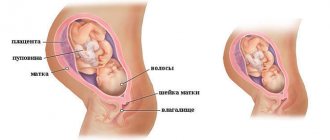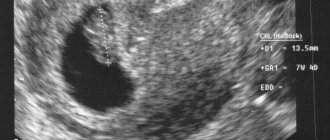How much joy and pleasant experiences the word pregnancy contains. Almost every girl dreams of a speedy addition to the family. As soon as the third trimester begins, the woman slowly begins to prepare for childbirth. Time flies almost unnoticed, but at this moment many processes and changes occur in the body. We decided to find out what this period is like, what week the third trimester of pregnancy begins, what dangers can await a young mother and much, much more. Candidate of Medical Sciences, obstetrician-gynecologist at the Women's Medical Center Evgeniy Petreikov helped us figure this out.
What are trimesters and how does the third differ from all others?
Trimesters designate periods of pregnancy during which both the body of the expectant mother and the baby itself develop differently. They are divided into three groups:
• first trimester - counted from the very first day of the last menstruation to the 13th week;
• second trimester - lasts from the 14th to the 27th week;
• third trimester - starts from the 28th week and lasts until childbirth.
However, differences can be noticed not only in the timing, but also in changes in the body of the expectant mother and directly in the development of the fetus. For example, in the first trimester, a small cluster of cells turns into a future baby, although in its infancy, its main organs, nervous and respiratory systems are already formed. The most surprising thing is that the child already has small fingers on which nails are visible.
The second trimester is already the active formation of all internal vital systems of the child’s body. During this period, the nervous system actively develops, thanks to which the baby can sense the space around him and respond to sounds. The intestines and urinary system also begin their work.
The third trimester is exactly the time when the baby is actively gaining weight and is preparing to be born and delight his parents. He is able to hear, see and feel everything around him. All systems are already actively working inside this tiny organism, so the baby often responds to the mother’s voice and kicks slightly from the inside.
But what does the woman herself experience during this touching period? As we said earlier, a huge number of changes occur in the body every day, due to which the expectant mother will be worried about:
• frequent urination - it is associated with an enlarged fetus, which puts pressure on the bladder;
• lack of oxygen - as the body is completely rebuilt to carry a child, the pressure on the lungs also increases. Because of this, discomfort and fainting conditions occur;
• aching pain in the back, especially in the lumbar region due to the baby’s weight gain;
• deficiency of vitamins and minerals - after all, in the last weeks of pregnancy, the baby’s needs can be equated to the needs of a newborn baby, which means that if there is a lack of certain vitamins, he will consume them from the mother’s body. It is worth noting that in the third trimester, a pregnant woman’s need for nutrients increases by approximately 40%;
• swelling of the limbs and face;
• insomnia - often occurs due to the fact that a woman cannot choose a suitable position for sleeping, as well as due to a discrepancy between the rhythms of sleep and wakefulness of the expectant mother and child.
What does an expectant mother need to do in the third trimester?
- Monitor your health. It is better to discuss any alarming changes with your doctor to avoid possible pregnancy complications. If a doctor prescribes tests and studies or gives a referral for hospitalization, it is better not to refuse. Sometimes it’s better to play it safe than to regret your refusal for the rest of your life.
- Eat right, watch your weight gain, and stay physically active. This will improve your well-being and provide a good quality of life for your baby.
- Rest more and worry less. When the baby is so sensitive to all changes in the mother’s mood, it is especially important not to disturb him with your worries. Rest will help the body recover at least a little, and communicating with the baby (singing, stroking the belly and talking with it) will contribute to its full development.
- Prepare for childbirth. Some couples express a desire to choose obstetricians and gynecologists who will deliver the child, and in some cases they want to participate in partner births. To do this, you need to find out all the details in advance, communicate and agree with the doctor, and familiarize yourself with the requirements. And it’s better to do all this in advance. It is also advisable that the bag with things for the maternity hospital is already packed, because when the water breaks and contractions begin, the woman will not have time to pack.
- Despite the fatigue and pain, you can still enjoy your position, because you can feel how your baby is growing, how he reacts to every sound and movement. Soon you will be able to hear his first cry. Take care of your baby's health!
Ultrasound and tests
All doctors tirelessly insist that pregnancy, even if a woman is absolutely healthy, should be under strict medical supervision. And despite the fact that the most dangerous period of bearing a child has passed, the baby’s condition must be carefully monitored. Therefore, at 20-22 weeks a second screening and triple test are carried out.
As for the later stages of pregnancy, a woman will have to visit her doctor at least twice a month. Visits may be more frequent, because everything depends on the individual characteristics of the woman. During examinations, the doctor measures the abdomen, the height of the uterine fundus and blood pressure. The set of analyzes during this period can be called standard:
• general blood analysis;
• Analysis of urine;
• smear on vaginal microflora.
In addition, the gynecologist will definitely include screening for gestational diabetes in the tests, which is based on the results of a glucose tolerance test.
As for ultrasound in the third trimester of pregnancy, it is performed only if the woman often complains about her health. Then the doctor may need additional ways to assess the baby’s condition, development and health. Ultrasound is also used to find out the gender of the child, since in the later stages of pregnancy this is quite easy to do due to the baby’s mature gender characteristics.
pixabay.com/StockSnap
NUTRITION FOR A PREGNANT WOMAN
What is possible.
In the third trimester of pregnancy, you can, and even need, to eat foods rich in:
- - fiber;
- iron;
- various vitamins;
- minerals.
Eat more vegetables and fruits, eat baked, stewed and boiled foods. Give preference to lean varieties of fish and meat.
It is recommended to increase the calorie content of your diet to 3200-3500 calories, but it is worth considering that caloric intake is calculated separately for each woman.
What is not allowed.
- fat;
- roast;
- soda;
- sausages;
- canned food;
- sweets;
- flour products;
- semi-finished products;
- pickles;
- spicy foods;
- smoked;
- salty;
How much fluid to drink.
It is recommended to drink within two liters of water daily. The amount of fluid required may be reduced, for example, in the presence of edema.
Vitamins for pregnant women.
- iron;
- folic acid;
- vitamin C;
- vitamin D3;
- calcium;
- lutein;
- routine;
- omega-3 and omega-6.
How to keep your weight under control.
The process of keeping weight under control in the 3rd trimester of pregnancy is no different from the first 2 trimesters. To avoid gaining excess weight, it is enough to monitor your diet and lead an active lifestyle.
Discharge
Many women begin to panic when they notice discharge in the third trimester of pregnancy. However, this should not be done if they are white, have a uniform consistency and do not smell of anything. This is the norm for the female body. But bloody or purulent discharge signals the presence of a dangerous viral infection in a woman’s body. Therefore, you should not self-medicate, but rather consult a doctor immediately.
If the discharge is watery, it may indicate the onset of premature labor. If fluid begins to be released in large volumes, you should immediately call an ambulance, which will hospitalize the woman.
You should try to come to your doctor for routine checkups to avoid such unpleasant moments.
COMPLICATIONS DURING PREGNANCY
The most common ailments.
- fatigue and weakness;
- hypotension;
- Iron-deficiency anemia;
- constipation;
- phlebeurysm;
- dyspnea;
- heartburn;
- constant change of mood;
- pain in the back and lower abdomen.
In what cases should you immediately consult a doctor?
- bloody issues;
- leakage of amniotic fluid;
- increased body temperature;
- cramping abdominal pain;
- convulsions;
- gestosis;
- colds;
- painful urination;
- impurities in urine;
- discharge with an unpleasant odor.
What medications can you take?
- saline solutions for rinsing the nose;
- paracetamol;
- miramistin;
- chlorhexidine;
- lozenges for sucking.
Other medications can only be taken as prescribed by a doctor!
What medications should you not take?
- aspirin;
- indomethacin;
- immunomodulators;
- antibiotics (allowed in extreme cases, and only certain classes);
- means that increase blood pressure;
- drugs acting on the coagulation system.
Lifestyle
In a conversation with our publication, Dr. Petreikov recommended that women in the last stages of pregnancy spend as much time as possible in the fresh air. He also explained that there are no special exercises that would make life easier for women carrying a child. In addition, the doctor drew attention to dubious methods of softening the vagina, which can be found on the Internet.
“There is gymnastics for pregnant women, which is carried out in every maternity school. There, women are shown the correct breathing technique before and during childbirth, shown comfortable sleeping positions and helped to maintain an active lifestyle without harm to the baby.”
pixabay.com/silviarita
Diseases
Due to the heavy load on the body, the immunity of the expectant mother noticeably weakens. Therefore, a woman can easily catch a cold, which will be accompanied by such unpleasant symptoms as headache, cough, runny nose and a general cold.
There is no need to panic, because in the third trimester of pregnancy it is no longer as scary as in the first weeks of bearing a child. However, it is worth noting that you should not buy your own medications yourself. It is better to immediately seek help from a doctor who will prescribe the correct and safe treatment.
However, there are still several rather dangerous situations that the common cold leads to. For example, severe nasal congestion can provoke oxygen starvation at the intrauterine level, and a strong cough can even cause premature birth due to involuntary contractions of the uterus. Therefore, it is better not to delay treatment and consult a specialist.
But what should a pregnant woman do if she is faced with such an unpleasant phenomenon as thrush? According to the doctor, its consequences for the child can be very unpleasant.
“During a natural birth, the baby can become infected with a fungal infection that causes thrush or streptococcus. Therefore, before giving birth, it is necessary to sanitize the vagina - around 28 weeks. After two weeks, the patient is tested.”
Since women in such a delicate condition cannot take potent drugs, patients are prescribed bifidobacteria and lactic acid bacteria. Normal treatment through sanitation, according to him, can only be carried out from 37 weeks.
pixabay.com/
When does the 3rd trimester of pregnancy begin and end?
The final, third trimester begins at the 27th obstetric week. It lasts 14–16 weeks and ends at 40–42 weeks. However, after the end of the 37th week, the fetus is considered full-term and viable, and many (especially multiparous) women give birth at 38–39 weeks.
However, you should not try to speed up the development of events by using various traditional methods of stimulating labor. The longer the baby stays in the mother’s womb (but no more than 42 obstetric weeks), the better he will be able to adapt to new conditions.
Intimacy
While sex can be dangerous in the first weeks of pregnancy, in the later stages it can bring a lot of benefits. As Dr. Petreikov previously told us, love pleasures help pregnant women lift their spirits, overcome emerging complexes about their appearance and body, bring both partners closer together, and even help prepare the cervix for an early birth.
It's all about prostaglandins contained in seminal fluid. These substances have the ability to quickly penetrate the mucous membrane and soften it, increasing the hydrophilicity of the uterus and thus preparing it for the imminent appearance of the baby.
However, even during the first trimester, it is worth discussing the possibility of having an intimate life with your doctor, since there are a number of contraindications, as a result of which the health of the child and the expectant mother can significantly deteriorate.
Pregnancy will turn out to be a real miracle if you entrust its management to an experienced specialist. Then every day will bring the expectant mother closer to the birth of the long-awaited child, while giving her only pleasant emotions and sensations.










